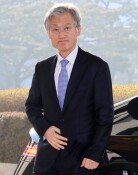Maternity Embracing the Parched Lives
Maternity Embracing the Parched Lives
Posted March. 07, 2003 22:35,

First of all, the title, Bell Sound, moves a hearing sense. In the novels by Shin Gyeong-suk, there is a subtle harmony along with peaceful loneliness, of a bell sound that disappears in the air little by little.
Even in this particular novel, Shin Gyeong-suk precisely portrays sorrow, disconnected relationships and solitude in her peculiar slow and solitude space. It clarifies the inner world of parched and worthless ordinary lives living in the current society where the opening and shutting of the world are constantly repeated.
In these pieces of work, there is a joy of discovering the maternity which doesnt leave the world in desolation but puts it together by firmly continuing the narration with the tight anxiety and slow roll over.
A woman who had her third abortion, a woman who thinks of herself as a ruin cant understand her husbands wander and eating disorder. One day, a strange bird makes its nest on the frame of a washroom.
Her husband might have dreamt about soaring bird once. Life in city immeasurably weakens the husband. At what did he shoot with his desperate effort? What was it? Solitude.
The woman sees a bird crowd flying in the sky in her dream next to her husbands sickbed. It seems as if her husband is among them. She says, You are like a returned bird now and embraces him with her widely opened wings. (Bell Sound)
She who works at the skin care center, has a memory of being abandoned by her mother. She sets fire every night due to not being able to bear the memory. A coffee house woman approaches her. This coffee house woman who raises an alligator in an aquarium in the middle of the coffee house, is dying from a sickness.
The connecting factor of these two is an alligator which gives different symbols to each woman. To her, the alligator is a fury and this kind of violence gets thrown at a building manager who makes her unstable. To the coffee house woman who had to abandon her daughter, the alligator with the maternity is a holy Temple. (Temple under Water)
Her works such as `Temple under Water,` `Looking into the Well` and `Water of the Moon` are all filled with images of water. Sloshing cool water materializes what the writer thinks of writing getting close to the motherly heart by embracing many exhausted lives.
A man and a woman, who hardly know each other except the fact that they live in the same apartment building, head for Buseoksa Temple on the first day of the year. It is the place where twin stones are floating around.
She remembers P, a man who she loved but left her to get married with another woman. Then one day, he sends flowers and a happy birthday card to her, and says that he will visit her in her apartment.
The man is a documentary photographer. He made a film about a wounded owl but was set up by producer Park he trusted so dearly. He finds out and feels betrayed, then Park calls him and asks a drink together.
The man and the woman are now on their way to Buseoksa Temple, not wanting to see P and Park any more. When the car is stuck in a slippery road on the hillside, they experience a loose but warm human bond at the still moment through a dog called `Wind.`
The writer says that he was `fascinated by writing finding small things shine brighter.` The beauty of small things could mean that we pave one road after another even facing constant disconnection in relationships.`
This collection comprises 6 stories released since 2000, including `Who Left Alone,` a dedication to the late writer Chae Young-ju.
Yi-Young Cho lycho@donga.com





![[천광암 칼럼]장동혁은 대체 왜 이럴까](https://dimg.donga.com/c/138/175/90/1/wps/NEWS/IMAGE/2026/02/22/133399127.1.jpg)

